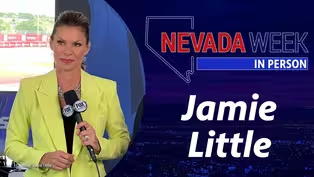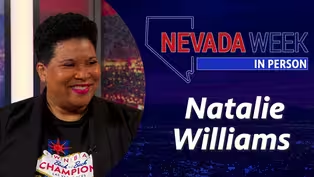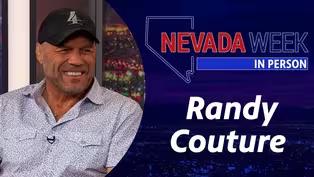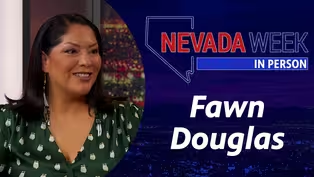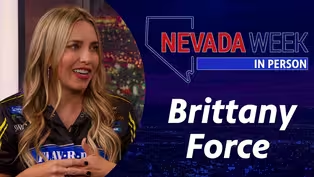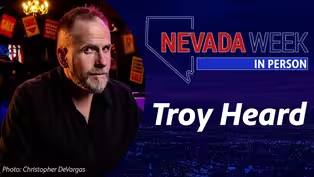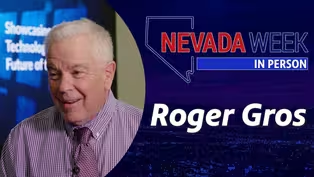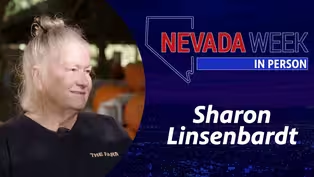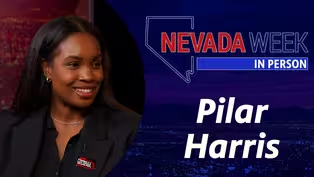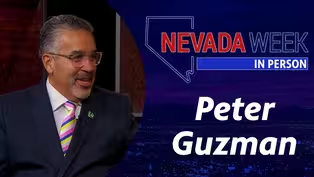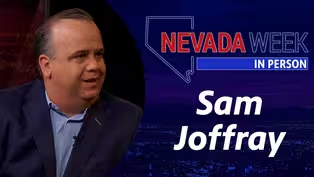
Nevada Week In Person | Jacob “Stitch” Duran
Season 1 Episode 67 | 14mVideo has Closed Captions
One-on-one interview with legendary cutman Jacob “Stitch” Duran.
One-on-one interview with legendary cutman Jacob “Stitch” Duran.
Problems playing video? | Closed Captioning Feedback
Problems playing video? | Closed Captioning Feedback
Nevada Week In Person is a local public television program presented by Vegas PBS

Nevada Week In Person | Jacob “Stitch” Duran
Season 1 Episode 67 | 14mVideo has Closed Captions
One-on-one interview with legendary cutman Jacob “Stitch” Duran.
Problems playing video? | Closed Captioning Feedback
How to Watch Nevada Week In Person
Nevada Week In Person is available to stream on pbs.org and the free PBS App, available on iPhone, Apple TV, Android TV, Android smartphones, Amazon Fire TV, Amazon Fire Tablet, Roku, Samsung Smart TV, and Vizio.
Providing Support for PBS.org
Learn Moreabout PBS online sponsorshipMore from This Collection
Nevada Week In Person goes beyond the roundtable discussion of Nevada Week with guests for a more casual conversation about their personal passions, new projects and compelling stories that are overlooked in the flurry of the news cycle.
Nevada Week In Person | Jamie Little
Video has Closed Captions
One-on-one interview with Jamie Little, NASCAR Broadcaster (14m)
Nevada Week In Person | Chet Buchanan
Video has Closed Captions
One-on-one interview with Chet Buchanan,Host & Creator, 98.5 KLUC’s The Chet Buchanan Show (14m)
Nevada Week In Person | Natalie Williams
Video has Closed Captions
One-on-one interview with Natalie Williams, General Manager, Las Vegas Aces (14m)
Nevada Week In Person | Randy Couture
Video has Closed Captions
One-on-one interview with Randy Couture, UFC Hall of Famer & U.S. Army Veteran (14m)
Nevada Week In Person | Fawn Douglas
Video has Closed Captions
One-on-one interview with Fawn Douglas, Artist and Activist, Nuwu Art (14m)
Nevada Week In Person | Brittany Force
Video has Closed Captions
One-on-one interview with Brittany Force, World Champion Drag Racer (14m)
Nevada Week In Person | Troy Heard
Video has Closed Captions
One-on-one interview with Troy Heard, Artistic Director, Majestic Repertory Theatre (14m)
Nevada Week In Person | Roger Gros
Video has Closed Captions
One-on-one interview with Roger Gros, Publisher, Global Gaming Business Magazine (14m)
Video has Closed Captions
One-on-one interview with Sharon Linsenbardt, Owner, Las Vegas Farm and Barn Buddies Rescu (14m)
Nevada Week In Person | Pilar Harris
Video has Closed Captions
One-on-one interview with Pilar Harris (14m)
Nevada Week In Person | Peter Guzman
Video has Closed Captions
One-on-one interview with Latin Chamber of Commerce Nevada President & CEO Peter Guzman (14m)
Nevada Week In Person | Sam Joffray
Video has Closed Captions
One-on-one interview with Sam Joffray, President & CEO, Las Vegas Super Bowl LVII Host Com (14m)
Providing Support for PBS.org
Learn Moreabout PBS online sponsorshipLas Vegas is known as the fight capital of the world.
And in the fight world, he is one of the most sought after cutmen.
Jacob "Stitch" Duran is our guest this week for Nevada Week In Person .
♪♪♪ Support for Nevada Week In Person is provided by Senator William H. Hernstadt.
Welcome to Nevada Week In Person .
I'm Amber Renee Dixon.
Whether it's stopping a cut from bleeding or an eye from swelling shut, his job is to keep a fighter in a fight.
And he's gotten so good at it, he's worked around the world and even played himself in movies like Creed I, II and, most recently, III , alongside the likes of Michael B. Jordan and Sylvester Stallone.
Jacob "Stitch" Duran, thank you for joining Nevada Week In Person .
-Well, thank you, Amber.
Congratulations on Otto.
-Oh, I appreciate it.
-You've come a long way?
I'm so proud of you.
-You're the father of how many children?
-Four.
-Well, congratulations on raising them.
Your nickname, Stitch, you earned it.
You told me in the past, you had worked on a fighter, and he said, Hey, you saved me from getting stitches, so I'm going to call you 'Stitch.'
But for people who may still be struggling to understand what a cutman does, could you maybe tell us a story of a time that your job was super crucial?
(Jacob "Stitch" Duran) Well, our job, is take care of the fighter and give them that opportunity, that one more round.
So as I walk into the dressing room, my job is to wrap their hands, in theory, so they don't break them.
And then come fight time, my job is to make sure that I minimize any swelling.
If there's a cut, then make sure that I take care of it so that it doesn't hamper him in winning a fight.
And when a referee or doctor stops the fight, Amber, it's because a fighter is at a disadvantage.
And my job is to take away that disadvantage.
-Is there a fight that sticks out to you in which you know you really earned your money?
-Yeah, there's plenty of fights.
I made a lot of money for a lot of fighters and kept them in the game.
Caleb Plant, when he fought Benavidez not long ago, you know, he ended up with a big 'ol cut, and I kept him in the game.
And he lost the fight, but his credibility just went up as being a true warrior.
Vladimir Klitschko, you know, when he fought Anthony Joshua in his last fight, kept him in there and, you know, to the point where I saw him in the dressing room, and I hadn't seen him since months before the last fight, but I put my hand on his shoulder and I said, "Look, don't worry about nothing tomorrow.
I'm gonna take care of you like my son."
And I leave because I know the night before, these guys can't sleep.
I'm putting the final Vaseline on Vladimir, and we're about this far apart, Amber, and he looks at me in front of all these people and says, "You could call me son."
And I called him-- or I talked to him in Germany about three months later, and I said, "That moment, why?"
He said, "Stitch, there's very few people I trust in my life.
You are one of them."
-And we got to explain for those who don't know who Vladimir Klitschko is, they may know his brother, Vitali Klitschko.
The Klitschko brothers both held heavyweight world titles at one time.
Vitali, right now the mayor of Kyiv, Ukraine, fighting against the Russians, as is Vladimir.
-Yes.
-What is the last that you have heard from them?
-Well, they're struggling.
And the last time I heard from Vladimir, he sent me a very beautiful message that, you know, it meant a lot for him-- for me to be with him.
And, you know, they're like my children.
And Vitali, my last words to him, he once again put his hand on my shoulder and says, "Stitch, you've been with us many, many years.
I love you.
You are family.
You're always welcome to my house.
And I said, "All right, but when you become president of the Ukraine, invite me to your inauguration.
So let's see if that works.
-So Vladimir, you first met him, was that in the Ukraine when you were taking fighters there?
-Yeah.
It was December the 12th, 1991, when the Soviet Union first broke.
And we took a team of professional boxers and kickboxers.
I had a kickboxer at that time, Mark Longo.
Vitali was a kickboxer.
But at that time, they were still young kids, Vladimir working towards the Olympics.
But they had big posters of them and all that.
And then when they came to train here at Top Rank, I brought those stories up.
And, of course, you know, when he filmed Ocean's Eleven , he says, "I want Stitch to be my cutman.
And from there, I started working with him.
-That is so wild that you became his cutman after being in a movie with him.
[laughter] -Yeah.
He tells Emanuel Steward, the guy that was in the movie with me, "I want him to be my cutman."
-A great trainer, Emanuel Steward.
-A great trainer, yeah.
Tremendous trainer.
-Okay.
So Ocean's Eleven , you were in that.
Most recently the Creed series, which is part of the Rocky series, working alongside Sylvester Stallone, at least in the first one, and then Michael B. Jordan.
We're going to talk about your roots, but with that in perspective, what is it like being in a major motion picture, an experience that most people will never have?
-It blows my mind every day.
You know, why me?
And I remember I told Sylvester Stallone in the first Creed , I said, "I can't sleep at nights."
He said, "What's wrong?
"I'm here with you, Michael B. Jordan, Ryan Coogler, Tessa Thompson."
He said, "You know what?
You earned it."
And I've always kept that in my mind that, you know, everything that's come to me, yeah, I think I've earned it.
I treat people well.
I try to keep it at the highest standard all the time, and it seems to be paying off.
-What else though?
How else have you earned it?
Because there are people out there who treat people well and may never receive those kinds of opportunities.
-I just, I don't know.
Is it the face?
I don't know.
Is it the name?
I don't know.
I ask myself why all the time.
I mean, God, I tell people, "How many people you know have done three movies with Rocky?"
Well, I have.
"How many guys you know, have done three movies with Michael B.
Jordan?"
Well, I have.
So I don't know.
-Perhaps you subscribe to the idea that if you give, you receive.
And I recently read that you returned home to Merced, California, your hometown, and bought 50 movie tickets to Creed III for migrant workers that you had worked with in the past.
Tell me about the migrant workers.
When did you work with them?
-Oh, God, I was born and raised in a migrant camp.
My birth certificate, for the address is CPC Number 12.
California Packing Company Number 12.
So I was born and raised in a migrant camp.
In the second grade, my parents bought a house in Planada.
It's three miles away from the camp.
And there I went, I grew up there.
But I was a migrant worker all my life.
And, yeah, so when the Creed movie came out, I bought 50 tickets.
Those I grew up with in the migrant camp, I invited them as my special guests.
And then the additional tickets, for guys I went to school with.
So yeah, we all went to watch the movie Creed together.
That's giving back, but getting back.
It's just so much energy.
Just talking about it gives me chills.
-Yeah, what drives you to do something like that?
-You know, my parents were always giving.
I think my whole family has always given.
And I think, you know, in the environment that we grew up, Amber, everybody had to give to get, right?
And I think that's always been our nature, and you know, continue doing that.
It's not that hard to do.
-How so?
How did you have to give to get?
-I had to give through hard work, honesty, just being truthful with people.
And that seems to be the ingredients for success.
You know, hard work for sure.
-How did that impact the person you've become?
You're also the son of immigrant farmworkers?
-Yeah, no, of course.
I use them as my inspiration.
Cesar Chavez was the one that really kind of helped us go through unfair practices in the farm working fields and all that.
So yeah, it just-- You're asking questions I've never been asked before, and stuck for me to give an answer.
But just to do what I do and do it at the highest level and respect people.
-How much did you get to interact with Cesar Chavez, the Latino leader, farm labor leader, civil rights activist?
-I was there that time when they made the walk from Delano to Sacramento.
I was a young teenager, right?
But I remember they walked through our little town, Planada.
Families took him up and kept him for the night and washed the clothes and fed him, and all that.
-About how old were you?
-I think 12, 13 years old.
-Wow!
-But my sister Linda continued to walk with them.
And so they've always been our inspiration, you know, our Martin Luther King, and the guy that really took us into the next level and gave us fair practices.
-What kind of impact did he have on you?
-I'm using it even now.
I always fight for the underdog.
And, you know, I always want to make sure that if things are done, they're done right.
And it's my nature, just second nature.
-And you have credited Cesar Chavez with what you believe in, in speaking out for what's right.
And you linked that also to the situation with the UFC, I believe, back in 2015.
You were employed by the UFC as a corner man.
That's when they reached a deal with Reebok, no longer allowing fighters and corner men like yourself to wear their sponsors on their shirt or in your case, because you were advanced, you had the idea of putting it on your medical gloves.
You know, that's what shows when you're, when the camera is in the fighter's face, your hands are on his face working on him.
Anyhow, that meant that you no longer could collect checks from those sponsors.
Fighters spoke out against it, and you did, but the UFC decided they no longer needed your services after that.
What did you think at the time, and what do you think-- Ten years have nearly passed since then.
How do you reflect on that?
How do you view it, what happened?
-People still stop me all over the world and thank me for speaking up.
But what had happened is John Nash from bloodyelbow.com-- never met him, never read his site-- he called me and asked if I'd be interested in doing an interview of how the Reebok deal affected the cutmen.
And of course, I thought about my parents.
I thought about Cesar Chavez, and I said, you know, if I don't speak up, my parents wouldn't be proud of me.
So the interview I did was very politically correct, but it went viral.
And I remember I did like 57 interviews in a week.
I had camera crews coming in my house, and it was the biggest thing in MMA.
And my friends called me, and their voices are cracking.
And the only thing they said is, "Because of the interview you did about Reebok, the UFC is not going to use you anymore."
And the first message I got, I responded to the kid that I gotta find a new job, UFC let me go, so and so.
That went viral.
And I got offers all over the world to work and doing the right thing.
But, you know, one of the best compliments I've gotten has been one of the Brazilian coaches when we did the Top Rank fights in the bubble during the COVID.
I hadn't seen him in eight years, and he comes up to me, Luiz Dorea, and says, "Stitch, we the coaches, the fighters, we thank you for speaking up, because we couldn't.
That said it all.
-What did that mean to your family?
-They're proud of me.
My daughter Carla called and says they're interviewing, one of the last fights I did, Robbie Lawler against Rory MacDonald, into the Hall of Fame.
Well, they're showing the clip of a video, and I'm right in the middle.
Because Rory MacDonald had a-- or Robbie Lawler had a big 'ol cut in his lip, and I'm working on it.
So you can't get rid of me.
-Do you have a favorite fighter that you've worked with?
-You know, the Klitschkos have to be on top.
Andre Ward.
You know, they're all good people.
But that's like saying, you know, I love this child more than I love this child.
They're all great people.
You know, it's behind.
It's not even about the championship fights no more, Amber.
It's about the relationships that we get behind the scenes.
You know, like Caleb Plant.
You know, we're getting ready before I even start wrapping his hands, he just comes up to me and gives me a hug and says I love you.
It's out of nowhere.
Those are the moments that make-- -Why do they do that?
Why do you call them "child"?
-Well, because Lyoto Machida, when he fought Rashad Evans, when he won the world title, it all started with this: His father is very Japanese, very Shogun-ish, I go in the dressing room after the fight and I said, "I'm proud of you."
And in front of his father.
He says, "Stitch, in the ring, you are my father."
So that was the perception that these guys had, that my job was to take care of them.
And they know that.
-Would you ever work for the UFC again?
-Well, you know, I never say no.
But it would have to be under different circumstances.
Right now, from what I understand is, you know, the cutmen still aren't getting paid what's due to them.
And I had said one time, "It's a shame when the ring girls get paid more than cutmen."
-Despite what may be considered poor pay for cutment, I'm sure there are people who want to get into this field.
And I remember from past interviews, you said it's not one of the fields where people share a lot about what goes into it.
What advice would you give someone wanting to be a cutman?
-It's good question.
And years ago before I had my school of kickboxing, I was making the transition from a coach to being a cutman.
Then it was boxing only, and this is California.
I asked this guy that did a good job.
This was boxing only, right?
"Hey, I'm trying to learn to be a cutman.
Can you tell me what you did?"
He says, "I'm taking this to my grave, and you gotta learn like me."
That was the mentality in boxing.
But I thought, I'm never going to be like that.
So I'm always going to teach.
So when people ask me, and I get doctors, EMTs, nurses.
I get messages all the time from all over the world.
So I said, Look, you got to spend hours, days, weeks, months, and years in the gym, working with these fighters, being a fighter.
Get in the mental game, get in the physical game, understand all that, and then you start wrapping hands for free.
And you get their confidence, and hopefully they'll bring you in to work cuts.
But it's a long process, and people see what I do, and they think I just walked into it, but I've been doing it for like 30 something years.
-Yeah, you're an expert.
Jacob "Stitch" Duran, thank you so much for your time.
And thank you for watching Nevada Week In Person .
To see more of Nevada Week In Person , go to vegaspbs.org/nevadaweek.
♪♪♪

- News and Public Affairs

Top journalists deliver compelling original analysis of the hour's headlines.

- News and Public Affairs

FRONTLINE is investigative journalism that questions, explains and changes our world.












Support for PBS provided by:
Nevada Week In Person is a local public television program presented by Vegas PBS
